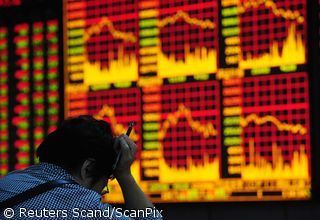Russia and its neighbors may boost crude oil shipments through an Israeli pipeline, helping them compete against Persian Gulf nations for sales in Asia
Published:
3 November 2003 y., Monday
The 254-kilometer Eilat-Ashkelon pipeline, which has flowed from the Red Sea to the Mediterranean for more than 30 years, will reverse direction for a second time in November. A tanker is set to leave the Red Sea port of Eilat, bound for Asia, with oil sent from Ashkelon on the Mediterranean.
Russia wants to sell more oil in Asia, where demand is growing faster than in Europe, as China and Japan seek to reduce their dependence on Middle East exports. The pipeline gives oil companies an alternative to the longer route around Africa and lets them avoid restrictions in Egypt's Suez Canal.
How much crude will be exported across Israel will depend on the so-called arbitrage window, when Russian oil prices are low enough to attract Asian buyers. The pipeline may make Russian crude oil, which costs about four times as much to produce as Middle Eastern grades, more competitive by reducing transport distances and costs.
Very large crude carriers, or VLCCs, which can carry about 2 million barrels of oil, take 10 days to travel from the Red Sea to Asia compared with 30 to 35 days from the Mediterranean.
A tanker is scheduled to unload about 2 million barrels of Russian Urals and Kazakh Tengiz crude at Ashkelon in the second half of November, shipbrokers said.
Šaltinis:
Bloomberg
Copying, publishing, announcing any information from the News.lt portal without written permission of News.lt editorial office is prohibited.
The most popular articles
 European conference promotes regional solutions to global challenges.
more »
European conference promotes regional solutions to global challenges.
more »
 Iceland‘s low-fare airline Iceland Express will launch regular flights by the new-generation „Boeing 737-700“ planes to about 8 different destinations from Vinius International Airport.
more »
Iceland‘s low-fare airline Iceland Express will launch regular flights by the new-generation „Boeing 737-700“ planes to about 8 different destinations from Vinius International Airport.
more »
 Over 3 million people around the world have lost their jobs due to the financial crisis and, according to the UN, economic recovery is unlikely to reach those that have suffered most - poor women and children.
more »
Over 3 million people around the world have lost their jobs due to the financial crisis and, according to the UN, economic recovery is unlikely to reach those that have suffered most - poor women and children.
more »
 The European Commission has today decided not to raise any objections to the public financing of infrastructure developments at three Lithuanian airports – Vilnius, Kaunas and Palanga International Airports.
more »
The European Commission has today decided not to raise any objections to the public financing of infrastructure developments at three Lithuanian airports – Vilnius, Kaunas and Palanga International Airports.
more »
 The European Commission has published the results of a public consultation launched in June 2009 on whether and how deadlines should be set for the migration of existing national credit transfers and direct debits to the new Single Euro Payments Area (SEPA) payment instruments.
more »
The European Commission has published the results of a public consultation launched in June 2009 on whether and how deadlines should be set for the migration of existing national credit transfers and direct debits to the new Single Euro Payments Area (SEPA) payment instruments.
more »
 A favourable climate for innovation in the EU can speed up the transition to an eco-efficient economy and increase Europe’s global competitiveness.
more »
A favourable climate for innovation in the EU can speed up the transition to an eco-efficient economy and increase Europe’s global competitiveness.
more »
 The International Monetary Fund (IMF) and the Deutsche Bundesbank have signed an agreement to provide the Fund with up to the equivalent of €15 billion (about US$22 billion).
more »
The International Monetary Fund (IMF) and the Deutsche Bundesbank have signed an agreement to provide the Fund with up to the equivalent of €15 billion (about US$22 billion).
more »
 Today the European Central Bank is publishing a report entitled “Euro Money Market Survey 2009”, which illustrates the main developments in the euro money market in the second quarter of 2009, in comparison with the second quarter of 2008.
more »
Today the European Central Bank is publishing a report entitled “Euro Money Market Survey 2009”, which illustrates the main developments in the euro money market in the second quarter of 2009, in comparison with the second quarter of 2008.
more »
 New EU laws proposed for closer oversight of financial services industry, sending a strong signal to this week's G20 summit.
more »
New EU laws proposed for closer oversight of financial services industry, sending a strong signal to this week's G20 summit.
more »
 The European Commission has repeatedly underlined that the restructuring plan of new Opel Europe must guarantee that the company will be viable in the future.
more »
The European Commission has repeatedly underlined that the restructuring plan of new Opel Europe must guarantee that the company will be viable in the future.
more »